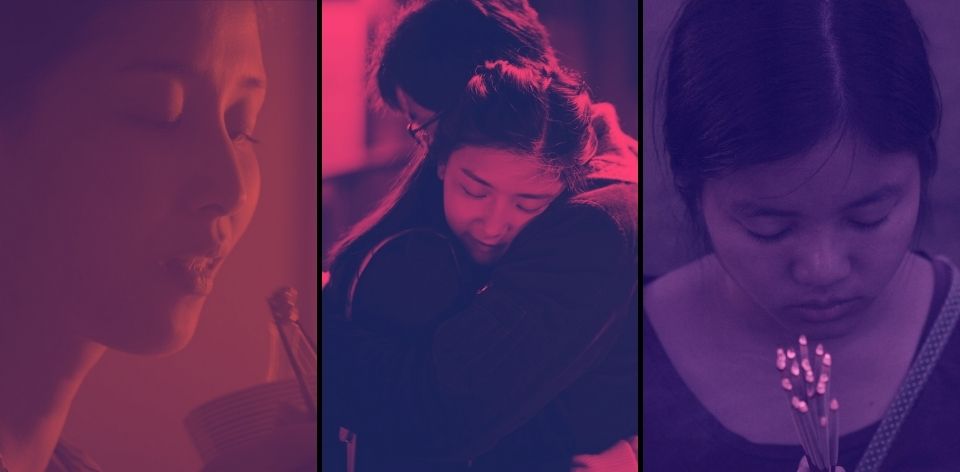
The 50th edition of the International Film Festival Rotterdam comes at a strange time for the film community. Like many festivals, they have deftly pivoted to accommodate the New Normal
As the global pandemic enters its second full year, the festival will kick off online from 1 – 7 February 2021 on the IFFR.com platform, and then continue through various formats into June.
As one of the first major post-Sundance festivals, it’s filled with world premieres, the prestigious Tiger Competition and a collection of short films. Here’s a collection of Asian cinema that IFFR is highlighting this year.
For a full program and screening details, check out the official festival site.
2021 world premieres
Sexual Drive
Japan, Dir: Yoshida Koda
A film about sex and food sounds like the perfect way to kick off 2021. Koda’s film is divided into three parts – Natto, Mapo and Ramen – it’s been described as erotic without being explicit. Comparing it favourably with the classic Tampopo, IFFR site describes an “orgiastically, natto-eating Masumi.” If they can make natto sexy, then this might be the cult erotic film of the year.
Dead & Beautiful
Taiwan/Netherlands, Dir: David Verbeek
This one is really intriguing. Dutch filmmaker David Verbeek’s explores Taipei’s nightlife as you’ve never seen it before: with vampires! After a weird night, five bored, super-rich friends find out they are vampires. It makes its world premiere at the International Film Festival Rotterdam in February.
As We Like It
Taiwan, Dir: Chen Hung-i, Muni Wei
The only thing that seems to be as versatile and adaptable as Shakespeare is new Taiwanese cinema. Adapting the Bard’s works, it follows the romance of Orlando and Rosalind, who is disguised as a man. Directors Chen Hung-i and Muni Wei (2019’s Always Miss You) have an all-female cast in a film that promises that it “upends the binary world.” This hits so many intersections, it shoots straight to the top of our must-see lists for 2021.
Drifting
Hong Kong, Dir: Jun Li
Starring three Golden Horse Awards winner Francis Ng, Loletta Lee and Kwan-ho Tse, Jun Li’s (The Secret Board) film examines Hong Kong’s homeless as they fight for their rights in the face of ever-expanding high-rises. While not shown, it’s interesting to note that this was shot during a period of intense protest on the streets of Hong Kong.
Bipolar
China, Dir: Queena Li
Shot in crisp black and white, Queena Li’s debut feature reimagines the myth of Orpheus in Tibet’s capital, Lhasa. A road-movie western set in the contemporary world, it follows a pilgrim who arrives in this place and sets forth on a dreamlike journey that she hopes will lead her back to the real world.
The Edge of Daybreak
Thailand, Dir: Taiki Sakpisit
Following a decade of experimental shorts and art projects, including the short film The Mental Traveller, Sakpisit’s debut comes with a bit of critical expectation. Set against the student uprisings of the 1970s and the 2006 military coup in Thailand, this monochromatic saga explores the shared trauma of a family interwoven with that of a nation.
More contemporary Asian cinema
Aristocrats
Japan, Dir: Sode Yukiko
Not to be confused with the infamous joke of the same name, it has been previously publicised as She Is Noble (from the more literal translation of That Kid is Noble). Sode Yukiko’s third feature, following Mime-mime (2008) and Good Stripes (2015), is an adaptation of a novel by Mariko Yamauchi (Japanese Girls Never Die). It follows the parallel stories of the Tokyo-bsed Hanako Haibara (Mugi Kadowaki) and the provincial Miki Tokioka (Kiko Mizuhara)
Septet: The Story of Hong Kong
Hong Kong, Dir: Ann Hui, Johnnie To, Tsui Hark, Sammo Hung, Yuen Woo-Ping, Ringo Lam and Patrick Tam
Look at that list of filmmakers! Almost six years ago, Jonnie To initiated this project as Eight and a Half with John Woo attached. Now he’s about the only person from the who’s who of Hong Kong cinema not attached to this series of vignettes that contemplates the city-state and its future. Each director tells a tale spanning from the 1950s to today, where the eyes of the world are on Hong Kong. This was announced last year as part of the Cannes Official Selection, and makes its Dutch/online premiere at IFFR.
Short films
Happy Valley
Hong Kong, Dir: Simon Liu
The titular Hong Kong area is synonymous with affluence and horse racing. Simon Liu’s short contrasts this against Hong Kong in a time of upheaval, capturing quiet 16mm shots of public spaces, small details and during one of the most turbulent times in the the region’s history.
Lemongrass Girl
Thailand, Dir: Pom Bunsermvicha
This allegorical short combines documentary with fiction. Long takes introduce us to the young Piano, tasked with keeping the rain away from a film production (in real life, the set of Come Here, from filmmaker and Electric Eel Films owner Anocha Suwichakornpong). Playing as part of the Ammodo Tiger Short Competition.
Tellurian Drama
Indonesia, Dir: Riar Rizaldi
Rizaldi’s 26-minute short film was described as ‘docufiction’ when it debuted at the Singapore International Film Festival last year. Blurring the lines between fiction and non-fiction seems to be a theme in the IFFR short selections this year, Rizaldi imagines the historian of an Indonesian location via colonial ruins.
The Eternal Springtime
Vietnam, Dir: Việt Vũ
With a title that recalls Rodin, Vũ’s film continues the colonisation themes. It follows a mother and son as they trek into a native cave and recall a life’s worth of memories together.
The Women’s Revenge
Taiwan, Dir: Su Hui-yu
Following his reworking of unfilmed scenes from 1985 Taiwanese cult film Tang Chao Chi Li, filmmaker Su Hui-yu pays tribute to the so-called ‘Taiwan Black Movies,’ a series of politically subversive 1980s sexploitation films that were suppressed by the Chinese Nationalist party during the Martial Law period. This should be fun.




